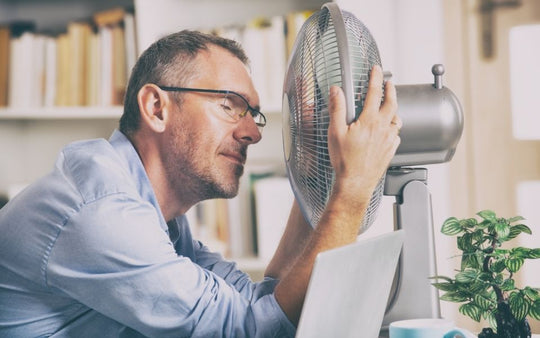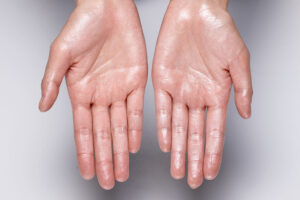Excessive sweating, or hyperhidrosis, goes beyond the average person’s response to heat or exercise. It’s characterized by an abnormal amount of sweating, significantly more than needed for regulating body temperature.
If hyperhidrosis affects your daily life, understanding the power of lifestyle changes is crucial. These adjustments can significantly reduce symptoms, empower you to make decisions not dictated by sweat, and restore confidence and comfort to your daily routine.
Dietary Changes to Manage Sweating
When tackling excessive sweating, the foods and drinks you consume play a pivotal role in managing your symptoms. It’s beneficial for you to be mindful of caffeine and spicy foods, as both can trigger your sweat glands into overdrive. Caffeine stimulates your central nervous system, increasing heart rate and, consequently, perspiration. Similarly, spicy foods can activate chemicals like capsaicin, tricking your body into feeling hotter and prompting a sweat response to cool down. [1] [2]
Foods high in fat and processed sugar can also prompt your body to sweat more. High-fat foods require more energy from your body to digest, increasing your internal temperature and, consequently, your sweat production. Similarly, foods with a high sugar content can spike your blood sugar levels, leading to a burst of energy that heats up your body and triggers sweating. Alcohol is another substance that can exacerbate sweating; it dilates blood vessels and increases heart rate, which can cause your temperature to rise and your body to sweat in an attempt to cool down. [3] [4]
On the flip side, staying well-hydrated is crucial. You might wonder how drinking more water helps you when you’re trying to sweat less. Hydration actually aids in regulating your body’s temperature. By maintaining optimal hydration levels, you help your body cool itself more efficiently, potentially reducing the need to sweat excessively. [5]
Natural Remedies and Supplements
Exploring natural remedies and supplements can offer you alternative strategies for managing excessive sweating. Herbal teas, such as sage tea, have been traditionally recognized for their potential to reduce sweat production. Sage contains compounds that may act on your sweat glands, helping to diminish their activity. Similarly, chamomile tea is praised for its calming effects, which can indirectly help manage stress-related sweating by promoting relaxation. [6] [7]
In terms of supplements, magnesium and vitamin B are believed to play roles in balancing your body’s temperature control. Magnesium helps regulate nerve and muscle function, which includes the activity of sweat glands. A deficiency in magnesium could disrupt this balance, leading to increased sweating. Vitamin B, especially B12, contributes to the overall health of your nervous system and metabolism, both of which can influence sweating. [8] [9]
It’s important to note, however, that while these natural remedies and supplements have been suggested to aid in managing hyperhidrosis, the scientific evidence supporting their effectiveness varies. Not all remedies will work for everyone, and their efficacy can depend on the individual’s unique body chemistry and the underlying causes of their excessive sweating. Before incorporating any new supplements into your routine, consulting with a healthcare professional is advisable to ensure they are safe and appropriate for your specific health situation.
Daily Habits for Sweat Management
Incorporating specific daily habits into your routine can significantly impact your management of excessive sweating. Regular bathing with antimicrobial soaps plays a crucial role in this regimen. By bathing daily, you help remove the bacteria on your skin that can mix with sweat and produce body odor. Antimicrobial soaps go a step further by reducing the presence of these bacteria, keeping your skin cleaner, and potentially reducing the amount of sweat produced. [10]
Applying antiperspirant at night allows the active ingredients to work more effectively, as sweat glands are less active, providing better control of sweat production during the following day. [11]
When it comes to clothing, your choices can also influence how much your sweating is noticed. Opting for fabrics that are breathable and moisture-wicking can be a game-changer. Materials like cotton, bamboo, and certain synthetic fibers designed for athletes are excellent at allowing air to circulate close to your skin, helping to evaporate sweat more quickly and keep you dry. Additionally, wearing light-colored clothes can help disguise sweat marks more effectively than darker shades, which tend to make sweat more visible. [12]
Maintaining a cool environment whenever possible can also help. Using fans, air conditioning, or keeping your living and working spaces well-ventilated reduces the ambient temperature, which can help prevent overheating and excessive sweating.
Lastly, keeping a sweat kit handy—including extra antiperspirant, body wipes, and a change of clothes—can prepare you for any unexpected sweating, ensuring you stay comfortable and confident throughout the day.
Physical Activity and Stress Management
Engaging in regular physical activity is paradoxically one of the most effective strategies you can employ to regulate your body temperature and manage excessive sweating. Exercise improves your overall fitness, which in turn enhances your body’s ability to regulate temperature more efficiently. Activities like swimming, brisk walking, or cycling, done consistently, can train your body to cool itself with less effort and less sweat over time. [13]
In parallel, mastering stress management is crucial in your fight against stress-induced sweating. Techniques such as deep breathing exercises, mindfulness meditation, and progressive muscle relaxation can significantly reduce your stress levels, reducing the likelihood of activating your sweat glands in response to stress or anxiety. [14]
Combining regular, moderate exercise with effective stress management techniques offers a dual approach to tackling excessive sweating. This not only helps in physically conditioning your body to manage sweat more effectively but also in creating a state of mental well-being that shields you from stress-triggered perspiration episodes.
Sweat Less. Live More.
Managing excessive sweating effectively involves a multifaceted approach that includes dietary adjustments, daily habits, physical activity, stress management, choosing the right antiperspirant, or alternative solutions. Each strategy offers its own set of benefits, and what works best can vary widely from person to person. Encouragingly, experimenting with different methods and combinations of techniques can lead you to discover the most effective way to control your symptoms. Remember, you’re not alone in this journey, and with persistence, you can find the balance that brings comfort and confidence back into your life.
Take control of excessive sweating with SweatBlock’s range of products, designed to give you the confidence and comfort you need to tackle hyperhidrosis head-on.
About the Author
Dr. Ali is a medical journalist and copywriter.
You might also like...

Why Does My Face Sweat So Much?: Tips And Treatments For Face Sweating
Table of Contents Do you ever feel like you’re the sweatiest person in the room?

How to Stop Sweating Naturally – Huge List Tips & Home Remedies
Table of Contents For most people, sweating is a totally natural bodily function. For others,

Top 10 Best Deodorants For Sweaty Armpits
Do you struggle with sweaty armpits? Has your deodorant let you down when it comes
















